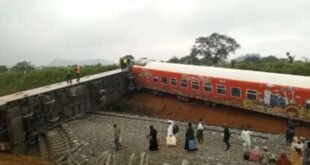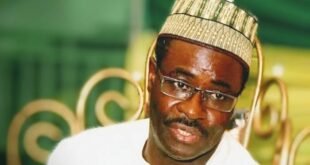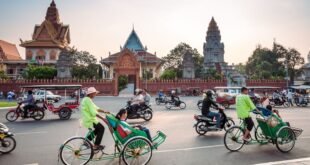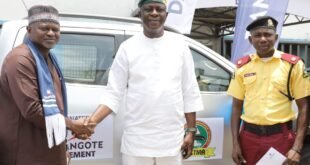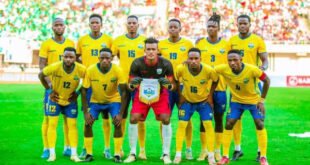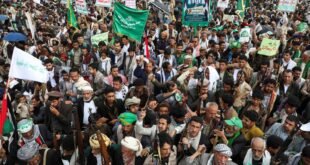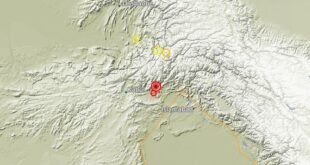Reviewer: Martins Oloja, former MD/Editor-in-Chief of The Guardian
Date; August 6, 2025
Venue: Yar’Adua Centre, Abuja.
A TIME FOR OUR ONE-SIDED STORIES
My main task here today is to deconstruct the relevance of two books written by a partisan journalist. Ike Abonyi’s declaration of himself as a partisan journalist should be curious. The work is a complex and dangerous combination of journalism and public relations, a subject I have been researching for a ground-breaking work: ‘Journalism Isn’t Public Relations’. Ike Abonyi has challenged the central idea of my ‘hypothesis’ as he has now dared to ask public policy and politics experts: what is wrong with being a partisan journalist? He is simplifying the question: Why can’t journalists be partisan too in a society that has entrenched a culture of impunity, where only men rule instead of the laws? That is: we need to pay attention to the message in the books we are about to launch today. When you read the books, you are likely to renew your mind about some people who use some curious sophistry to impose their opinion that journalists are writing and promoting single or one-sided stories in a multi-ethnic, multi-cultural society. At a recent convention of the Nigerian Guild of Editors (NGE) a senior intelligence chief who delivered a keynote spoke extensively on “The danger of a one-sided story”. Now a political journalist who crossed over to a partisan beat of political management who was writing from the beat for the mass media as a partisan journalist may be challenging the allegation of one-sided stories? Who is a partisan journalist? The answer may be blowing in the wind until the book is unveiled for public consumption.
The Bubbles of Nigeria Democracy: The Musing of a Nigerian Journalist
The 530-page book is a compilation of the reportorial and analytical work of an organic journalist who spent more than 30 years in the newsroom of four different newspapers (Triumph, Kano, Champion, ThisDay and New Telegraph) plus a nearly a decade in the corridors of power of political Parties (PDP and Labour Party). It is a rich memoir, a guide for political writers and analysts.
The book has 106 articles capturing different topics depicting the political activities of this republic from 1999 to 2023. These works are mostly drawn from a weekly political column signed as “Political Musing”, published every Thursday on the Back Page of the New Telegraph Newspaper, where the author was a pioneer, Deputy Managing Director. He has maintained this column since the inception of the newspaper in February 2014. On the founding of the Global Upfront Newspaper in 2019, the column has also been published in the online (digital) newspaper every Thursday.
By its various topics, the book is a collector’s item, topic by topic of critical events in our polity in this republic. But it is undoubtedly a focused column that has its own ideological leaning. In the book, you will find out that there was a delegate from Cameroun in President Jonathan’s 2014 Conference from an article titled: “The confab’s Cameroun delegate”. You will also find interesting articles such as “Aisha’s rebellion and Buhari’s presidency”. Did Aisha, former First Lady actually rebel inside Aso Villa’s fortress? Find out in the book in the book too When the other room was locked”. You will find out an interesting piece on how “Almajiri puts northern leaders in the dock”. There more..
Wadata Wonders: Memoirs of A Partisan Journalist_
The book, whose name is derived from the name of the building housing the Headquarters of the Peoples Democratic Party, PDP, is a 168-page work that mirrors the few years the author spent at the Headquarters of PDP serving as media Adviser to two the National Chairmen, Dr. Okwesilieze Nwodo and Prince Uche Secondus.
The author, as a journalist in this book, has put down some of his experiences mingling with politicians at a very high level in party management. According to the author, it is a story told by “a journalist inside the umbrella as it rains with the actors and actresses”.
The PDP has been rolling in and out of crisis even during their 16 years in power but it got worse when they lost power to the then-opposition APC in 2015. And the party is still smarting from its crisis of coherence. The book, in 29 short readable chapters, captured all the dimensions of PDP up to date.
The author feels from his journalistic perspective that what he saw politicians do in the PDP, especially in nearly four years of Prince Uche Secondus, easily the longest stable regime in the PDP life is nothing but wonders to the ordinary eyes. You will see this from interesting titles such as “From the Ashes”, through “Prayer, As A Weapon of Political War”, “Like Nwodo, Like Secondus”, “Wike: Tinubu Emerges PDP Highest Bidder”.”Wike, A TseTse Fly on PDP’s Scrotum” to “Will PDP NEC Mend Limping Fractures?” If you want to become an emergency oracle on what will happen to the PDP, now in the eye of a storm, buy a copy of the book and read. If you want to know the origin of Wike’s involvement in the rise and rise and tumbling of the fist ruling party in this dispensation, get a copy of the book and read. Let me wet your appetite with these excerpts on Chapter 24 of Wadata Wonders
The article titled: ‘Wike: Tinubu emerges PDP’s Hghest Bidder’
Who owns the People’s Democratic Party? Is it the people as the name implies? Today, there are two PDPs, one belonging to Nyesom Wike and working closely with the ruling APC, and another led by flag bearer Atiku Abubakar. None of them can stand strong as a credible opposition party. How and why did the party get to this crossroads? A one-word answer is GREED. The party’s leaders saw sugar and jumped at the Greek gift, engaging their faculties in the reverse gear…. They did not care a hoot about the after-effects of the sugar or is wheeler-dealer source until it had entered their bloodstream…’
The full piece reveals how the rain began to beat the PDP now riding a terrible storm. Buy a copy the book to read the effects of the gift that is making a way for one of the owners the author identified in the article from page 114 of the book.
The rider in the second title, Memoirs of A Partisan Journalist excites me as a journalist. And here is why: In Nigeria, all of us in the media have been dragged into a single box office by long years over-centralisation of political activities and media ecosystem. What do we do in the box? We are told about the expediency of balancing stories. We have been wired to respect ‘fairness doctrine’ in addition to respecting a rule that is cast on a marble that “facts are sacred”. And here is the thing, any time we do a story about the North and the South, any time we report on the ruling and the opposition parties in any dispensation, we are bound by professionalism to be fair to all the parties, even if both parties evade the truth we are told to be loyal to. In this mode, we are told to avoid use of certain terms while describing certain tribes and people even if your descriptions and epithets are factual. We are told to tell stories of troops in war zones in certain ways even if some criminal entities in command positions in the armed forces are endangering the lives of some officers.
What is more, the gatekeepers, the editors have been wired to be conflict-sensitive in national interest, even if it is to protect the enlightened self-interest of the heads of state and political leaders. We are told to ensure that we don’t undermine state security by telling certain truths about state actors even if they are stealing our pubic funds with all their strength. That has been a dilemma we haven’t resolved.
My analogy above is the story of the relevance of Ike Abonyi’s one-sided stories of a partisan journalist the two books threaten to represent. In the book, Abonyi the political journalist and columnist has demonstrated to us what been happening in most media ecosystems in the world: there is no neutrality anywhere. In the United States, people of various backgrounds including university scholars freely join political parties. The political parties are distinctively ideological in orientation. People are either of the Republican Party (conservative) or National Democratic Party (liberal).
In 2013, as Editor of The Guardian, I was invited to be on the entourage of scholars from NIPSS, Kuru, Plateau State who were then on a study tour of United States for the year’s study theme: “Management of Political Parties”. The team led by the then Director General of the Institute, Professor Tijjani Muhammad Bande, hired two professors from George Washington University’s Political Management School as resource persons to one of the sessions for the study in the U.S capital. The two professors, one female and the other male, introduced themselves as members of the Republican Party and National Democratic Party respectively. Here we don’t have respectable political parties that can attract members from various backgrounds. Political Parties here (in Nigeria) that appear to be acting as just special purpose vehicles (SPVs), don’t shop for members from even the business communities, let alone the universities. They attract members only from what Franz Fanon calls “the wretched of the earth” from professional bodies such as National Union of Road Transport Workers (NURTW). So, they are there expecting at all times the balancing acts from the media. They don’t remember what they see in the West, specifically in the United States where there is a great deal of diversity in the media ecosystem: The CNN audience is different from the FOX NEWS’, for instance. The New York Times editorial orientation is different from the Los Angeles Times’ and Washington Post’s, etc. In the United Kingdom, the BBC isn’t re-echoing or competing with the SKY NEWS in covering the old Great Britain. They have their BBC World, covering the world for Britain, while SKY NEWS covers Britain for the world.
What UK newspapers do you read? Why?
Years ago, on a very clever and funny British sitcom about government (yes, I know, but it really was clever, funny and very popular), called Yes, Prime Minister there was a lovely bit of dialogue on the subject of who reads which newspapers: PM Jim Hacker: Don’t tell me about the press. I know exactly who reads the papers:
The Daily Mirror is read by people who think they run the country, The Guardian is read by people who think they ought to run the country, The Times is read by people who actually do run the country, the Daily Mail is read by the wives of the people who run the country, the Financial Times is read by people who own the country, the Morning Star is read by people who think the country ought to be run by another country and The Telegraph is read by people who think it is the PM.
Sir Humphrey: Prime Minister, what about the people who read The Sun? Bernard Woolley: The Sun readers don’t care who runs the country, as long as she’s got big tits. This joke wasn’t new, it actually predated Yes, Prime Minister by several years, but it referred to the Sun’s tradition of Page 3 girls (wearing very little) in particular. It was close enough overall to the perceived truth to be funny! Personally, as someone in no position of importance, and without much money, I actually read The Times for preference. It’s mildly conservative in style (nowhere near as consistently right-wing as The Telegraph and The Daily Mail) but actually provides space for a very wide spectrum of political views, the writing is mostly of a high standard, and the online discussions between readers are very lively and entertaining. Worth the subscription to get past the paywall, in my opinion.
Abonyi and imperative of alternative views in a democracy
The author shows in so many articles in both books that in a functioning democracy, the presence of alternative views is crucial for ensuring that citizens have access to a wide range of perspectives and ideas. This diversity of thought allows for informed decision-making, promotes critical thinking, and fosters a more inclusive and equitable society.
The benefits of alternative views
Alternative views provide a necessary check on power and ensure that those in authority are held accountable for their actions. By presenting different perspectives, alternative views encourage critical thinking and promote a more nuanced understanding of complex issues. This, in turn, leads to more informed decision-making and a more engaged citizenry.
The importance of dissent
Dissent is a vital component of a healthy democracy. It provides a necessary check on power and ensures that those in authority are held accountable for their actions. Dissent also promotes critical thinking and encourages citizens to question the status quo.
The challenges of promoting alternative views
Promoting alternative views in a democracy can be challenging. Those who hold dominant views may seek to suppress dissenting voices, and the media may be pressured to promote a particular agenda or ideology. However, it is essential to overcome these challenges and ensure that alternative views are given a platform.
Abonyi’s courage in declaring himself as a partisan journalist is a remarkable statement to the media and managers of the political parties that we can’t continue to follow the same line of action or policy thrust. The imperative of alternative views in a democracy cannot be overstated. Alternative views provide a necessary check on power, promote critical thinking, and ensure that citizens have access to a wide range of perspectives and ideas. The media plays a crucial role in promoting alternative views, and dissent is a vital component of a healthy democracy. By promoting alternative views and embracing dissent, we can create a more inclusive, equitable, and just society. That is what Abonyi has shown and Editors who are blaming the social media for poor sales and advertising patronage should ask market surveyors and scholars to do a survey and research on What Nigerian newspapers do you read and why? The responses to questionnaire here will help us to be more focused and customer-centric in our content production, just like the British and others.
Abonyi’s bold statement in his books demonstrates that a time to be balanced is gone. It ‘s a digital journalism story time. It’s a time to have news journal that will tell the story of enterprise in the South East. It is a time for the story of very educated elite and in the South West. It is a time to ask the media and the elite what happened to the South West. It is a time to tell the story of intentional agriculture in the North. It is yet another time to ask the northern elite and their media what happened to the Ground pyramid in Kano?
Abonyi is saying through his book you will enjoy that it is a time to ask the Nigerian elite and in the North and the South what happened to the very influential New Nigerian, Daily Sketch, Herald, The Tide, The Star, The Standard, The Chronicle, (where it all began for Raymond Ekpu), The Pioneer, Triumph, which used to tell Nigerian readers the difference Kano used to make via the party of the ‘talakawas’, People’s Redemption Party (PRP).
It is a time to tell the story of the ‘Tiv Riot’ and how its effects are still fuelling the current insurgency in Benue State some alleged ancient land grabbers have vowed to conquer.
It is a time to tell the so-called one-sided story of how a businessman from the Hausa people they continue to claim the Fulani conquered has established the world’s only single largest train of refinery in Lagos and not in Kano. It is a time to tell the world that the only rival who is trying to compete with Alhaji Dangote in Lagos is another man from Kano, the same Kano of the Bua Group, Alhaji Rabiu.
It is a time to tell a single significant story of how Ernest Sisei Ikoli, the first notable journalist in Lagos and indeed West Coast of Africa from Brass in Today’s oii-rich Bayelsa State formed the first Lagos elite party, Lagos Youth Movement, which he later renamed Nigerian Youth Movement.
It is a time to ask Alhaji Bukar Zarma, a Babur man, not Kanuri from Borno state why there is no longer an Abuja Newsday, Abuja’s premier newspaper, which began to tell a so-called single story of the Abuja’s indigenous population, original inhabitants and how they surrendered their heritage their organic fathers’ land to other Nigerians who were looking for a new national capital, exactly forty-nine year ago.
It is a time to tell another one-sided but significant story from Africa to the so-called powerful G-7/8 members that “Africa has come age” as was originally told some 49 years ago when Hurricane Ramat Hohammed told them when the Africa was united about the independence of Angola.
It is a time to find a journal of a one-sided story, which will contextually report the main reasons the Kanuri-centric people of North East are resisting the renaming of their iconic University of Maiduguri after a General and a former President of north-western extraction.
It is a time to tell the one-sided (partisan story) of the plights of Christians in Tafawa Balewa LG areas in Bauchi State, Biliri People in Gombe State, Zuru in Kebbi State, and in many Local Governments Areas in Adamawa state. These people and many others from other places including Christian-dominated Southern Kaduna (state) where their even brilliant children still cannot gain admission to read some courses even in federal universities such as Medicines even if they score the maximum point in UTME. Who will tell the single story of even the professors who are Christians but can never apply to be vice chancellors of even federal and state universities located in certain jurisdictions in the same northern Nigeria?
Who has written a one-sided story of how a state in the South South, Akwa Ibom State, has established actually one of the most reliable, if not most preferred airline, Ibom Air, in a complex federation where even the federal government duped its people for eight years about revival of a national carrier they claimed they established on their last day in office with a scandalously painted aircraft from Ethiopian airline? It is a time for the same Akwa Ibom people to tell a one-sided story of how they also constructed the only FIFA-certified stadium in their capital Uyo, which is very close to Malabo, capital of another country.
What is the significance of all these so-called single or one sided stories as some narratives of some state actors and non-state actors who are paid to spin for them always try to impose some agenda on all us? We need to emulate Ike Abonyi even if we are called partisan reporters or writers so that most of the muted voices in various locations across the country can be heard through community journals, newspapers and radio and televisions.
On the whole, Ike Abonyi’s two well-written books should be encouraged by buying more copies because they represent alternative views. Let us have more so-called partisan voices and pieces so that we can be better in
formed about what our public officers are doing and what they have failed to do.
Stay ahead with the latest updates!
Join The ConclaveNG on WhatsApp and Telegram for real-time news alerts, breaking stories, and exclusive content delivered straight to your phone. Don’t miss a headline — subscribe now!
 JamzNG Latest News, Gist, Entertainment in Nigeria
JamzNG Latest News, Gist, Entertainment in Nigeria
